- Home
- Stephen R. Donaldson
The Man Who Fought Alone Page 6
The Man Who Fought Alone Read online
Page 6
I had no business calling him. Of course. He had his wife to take care of. An overdose that massive might’ve burned out her brain, leaving a husk where an open and lovely, heart-wrenching woman had once been. The last thing he needed was frantic phone calls in the middle of the night from men who were big enough to fend for themselves.
But he knew things I didn’t, and he’d helped me before.
As soon as I heard his voice, I knew I’d gotten him out of bed.
“Sam,” I said. “It’s Brew.”
Then I seized up. I had no business doing this to him. No business—and no right. Even his silence over the phone seemed to ache for rest.
But he didn’t try to get rid of me. “Brew.” Recognition sharpened his tone. “Where are you? Are you all right?”
He knew I was on the run from el Señor. He knew why.
I couldn’t tell him where I was. Safer for both of us. And the sound of his weariness closed my throat on everything else. Awkward as a cripple, I replied, “It doesn’t matter.” Desperate inside, and afraid to show it, I asked, “How’s Queenie?”
“Brew.” From somewhere Sam mustered the strength for severity. “Did you call me at 1:37 A.M. to ask that?”
He was my friend. “No,” I admitted. “But I want to know.”
The memory of the way she’d been hurt felt like Estobal’s bullet in my gut, leaden and cold.
His voice sagged. “It damaged her. She’s lost seven or eight years of her life. They’re just gone. She has no idea how we met, or how long we’ve been married, or what she did before—” His throat closed, too. He had to force out words. “But at least she remembers me. And she’s recovering well in other ways. Balance, mood, reflexes. She may remember more as she gets stronger.”
Maybe I shouldn’t have bothered him in the middle of the night. Nevertheless he was definitely the right man to call. The right friend for me. He understood—
My eyes burned, for Queenie as well as for myself. “Thanks for telling me,” I said, my voice hoarse. “She’s a terrific woman.” I would’ve prayed for her if I’d thought my prayers ever did any good. “She deserves better.”
“So—?” he prompted.
So why did I call?
“Ginny and I are safe,” I told him. Fighting obstructions that crowded my chest. “Don’t worry about that.”
“So—?” he repeated. It was still the middle of the night.
Despite his exhaustion, I made him wait while I took a couple of deep breaths and fought to clear the bullshit out of my way. Then I said simply, “She doesn’t want me for a partner anymore.”
Sam didn’t hesitate. “She said that? You’ve been known to do some mind reading when you think no one will notice.”
I was in no condition to recite her exact words. “She got a job without me. She told me I’m on my own. She didn’t say much about what she wants.”
Although I could guess—
He paused to think. Not long, but long enough to scare me. I was afraid he’d ask me why I cared.
Then he said, “Brew, I know this is difficult for you. But you’re stronger than you realize. You work hard not to realize it. If you admitted the truth, you’d have to take responsibility for yourself.
“I’m not talking about drinking. I’m talking about not drinking. You pin that on Ginny. You tell yourself you don’t drink because you couldn’t survive if you lost her. But it’s your decision, Brew. You’re the one who chooses. Every day.” He sighed. “Then you lie to yourself about it.
“I can’t make you face the truth. I wish I could—but I’d probably be dangerous if I had that much influence on people.”
Now his tone suggested a smile that I remembered vividly, full of friendship I hadn’t earned. “Queenie remembers you and Ginny. We talk about you from time to time. In the morning I’ll tell her you called.
“I’m going back to bed.”
When he hung up, he left me with the sensation that I’d come this close to knowing what he meant. But the obstacles in my chest had become storms, and I couldn’t go the rest of the way.
I should at least have told him that I still wasn’t drinking.
The next morning before I left the apartment, I wrote Ginny half a dozen notes. They said things like, “Pack your stuff and get out. You can stay with Marshal.” Or, “I’m working at The Luxury this weekend. Give me a call when you get a chance.” Or just, “Are you all right?” But I tore them all up.
I probably could’ve called her. Or called Professional Investigations and left voice mail for her. But I didn’t do that either. Instead of clutching after her, I went to work.
By 7:45 I was back at the hotel with my suit clean and my sunglasses polished. The .45 I left in the Subaru under the driver’s seat. Armed with nothing except concern and sleep deprivation, I headed across the parking lot to tackle my new job.
The first job I’d found for myself—sort of—in more than a decade. Certainly the first job I’d faced alone.
Ginny was fucking Marshal right now.
She was in trouble—she needed me.
Sam’s advice seemed impossibly far away, like a voice you hear in dreams.
The lobby was already busy. Men, women, and kids dressed in warmup suits or martial uniforms clustered around each other, obviously waiting for the convention hall to open. Various parents and instructors kept tabs on the kids as best they could. A number of the competitors carried what I assumed were weapons in cloth or canvas cases like ski totes, and everyone seemed to have a gear bag. But I wasn’t on duty yet, so I ignored the details. Instead I trudged across the lobby to Bernie’s office.
I found him there, apparently handing out duty assignments to half a dozen men in hotel Security blazers with badges pinned to their breast pockets. Practicing my manners, I withdrew and started to close the door, but he gestured me into the office with a vehement flap of his hand.
As soon as I’d complied and shut the door, he announced, “Men, this is Axbrewder. Watchdog insisted on extra security, so he’ll be working the tournament with us.”
By way of introduction, he listed a handful of names I didn’t try to remember. His guards nodded at me like I was none of their business. Or maybe they were just bored. Hotel security wasn’t usually what I would’ve called stimulating work.
“I want you to know him by sight,” Bernie went on, “because he won’t have ID. He’s undercover”—he snorted the words—“so the rest of us can concentrate on staring at antique artifacts.
“Just for variety, we’ll use channel seven.” Dutifully the guards unclipped walkie-talkies from their belts and clicked the dials. “Max will be on the monitors as usual, since he seems to be the only one who can sit there and stay awake. Coordinate with him. I want two of you on that display at all times, and two more nearby.”
His men nodded again. They’d all done work like this before.
“And remember,” Bernie added, “nobody goes off duty until the night shift is in place. Watchdog won’t cover us unless we have a full crew. Plus Axbrewder.
“Let’s go.” He slapped his hands together. “Sternway wants to open the doors as soon as those gooks deliver their display.”
Murmuring to each other, his crew left the office.
While they filtered out, he handed me up a cell phone. “You don’t get a radio. If anyone sees it your cover is blown, but every hotshot here already has cellular. Just hit ‘send’ if you need something. It’s set to dial straight in to Max. He can patch you to me.” He indicated a small receiver in his left ear. “Or get the paramedics. Or the cops.
“Just be discreet about it.”
“No problem.” Hiding the way my hand shook, I slipped the phone into a pocket. “But if I have to call from the men’s room, you can’t hold me responsible for the background noise.”
Glaring, Bernie stifled a grin. “Just don’t puke on the air. Max has a sensitive stomach.
“Come on.” He pointed me at the door. “Sternway wa
nts to meet you. Since he’s paying half your wages, he’d like to know what he’s getting.”
I didn’t waste any more time on jokes. They were for my benefit anyway, not Bernie’s—an attempt to defuse my anxieties. I’d lost something a hell of a lot more critical than a hand. I hardly knew who I was anymore.
If Ginny were here, I could’ve done this job in my sleep.
Nevertheless I wanted to do it right. As soon as Bernie joined me in the hall, I asked, “Who’s delivering these ‘artifacts’?”
“They belong to a local karate school, Essential Shotokan,” he explained as we walked. “Or to their ‘sensei,’ a gook named Nakahatchi. That’s something I don’t even try to understand. Nakahatchi’s a Jap, but the display is supposed to be Chinese. Has something to do with martial arts history.” He grunted under his breath. “Essential Shotokan is responsible for it until it gets here. They’ll probably have a damn parade when they deliver it.”
We strode briskly across the crowded lobby. “The problems you’ve had at past tournaments,” I asked while I had the chance, “were they random, or did they look organized?”
He stung me with another glare. That may’ve been his way of smiling. “Stop trying to impress me. If I knew the answer, I would’ve mentioned it already. Hell, if I knew somebody was running a team through here, I would’ve pulled in the cops.
“But I’ve always suspected—” Abruptly he paused, turned a frown on the ceiling. “If you want to know my personal reason for letting Watchdog pressure me into hiring you, that’s it.” Then he jerked into motion again. “Maybe I’m getting paranoid. The punks we’ve caught in the past act like kids looking for thrills.”
Which meant nothing. A decent team wouldn’t have much trouble avoiding guards as obvious as hotel security.
In the direction of the tournament, the crowd thickened. Competitors and spectators wanted into the hall. Bernie had to slow down, pick his way. I followed as unobtrusively as I could, and after a bit of squirming I reached the nearest doors a couple of steps behind him. He held a door open for me, then let it close when I was inside.
“Don’t worry,” he muttered, although I hadn’t said anything. “Your cover’s safe. The gooks’ll think you’re one of the dignitaries.”
Nodding, I took a quick moment to look around. Since my previous visit, someone had hung a huge satin banner above the long table at the head of the hall. Orange letters on a black background said simply:
International Association of Martial Artists.
By the door, a large poster listed the day’s events and starting times. Some of the terms were obvious—“masters,” “junior division,” “black belt.” Others—kata, kumite, katame, kobudo —didn’t convey a thing.
Arrayed in front of the head table were maybe a hundred trophies, ranked by size. A hundred, for God’s sake. That was way too much self-congratulation to suit me. They all sported a black wooden frame like a formal oriental arch on a pedestal, with a gold figure under the arch doing an impossible kick. The small ones looked to be about two feet tall. The big ones, eight or ten of them, were practically my height.
At the back of the hall a registration table had been set up, but at the moment no one attended it.
The air felt almost frigid. The Luxury had cranked up the air-conditioning so that the hall wouldn’t get too warm later.
At least twenty people had gathered ahead of us, clustered in front of the head table—two guards, ten or so men and women in business suits, plus nearly that many more, all men, wearing formal versions of the martial uniforms I’d seen in the lobby. Now I understood why Bernie called them “gooks in pajamas.” Less than half of them were Asian, but they all could’ve been dressed for bed. Some of the outfits were bright silk pants and shirts with wooden buttons. The rest were wrap-around white canvas. However, the wrap-arounds wore black belts that had been knotted and reknotted until they’d started to fray white. The silk suits had bright sashes in contrasting colors.
Privately I inclined toward sneering at them. These people had dedicated themselves to something that didn’t seem real. What the hell was a “martial art” anyway? If they considered violence an art, they were all crazy. And if they’d turned it into a sport, it was just a game. Sports followed rules. Violence didn’t.
Roughly half the business suits sported lightweight audio headsets. Presumably they’d supervise the tournament. As Bernie led me closer, I saw that most of the suits and a majority of the canvas wrap-arounds wore identifying patches, either over their hearts or on their left shoulders. The patches had the yin-yang symbol picked out in orange on black, with the letters IAMA below it. I guess the silk pajamas didn’t want needle holes in the fabric.
One of the suits appeared to be holding court for his assembled vassals. He was Marshal’s height, but leaner, and maybe ten years older, judging by the lines of authority on his face and the distinguished mix of grey in his black hair. He seemed perfectly relaxed—he didn’t even use his hands while he talked. But something about his carriage reminded me of C-4, passive and malleable until you stuck in a detonator. His pale eyes moved constantly, but without urgency, as if he searched for something that he didn’t need to find in a hurry.
Once I’d noticed his resemblance to an explosive, I caught hints of the same thing around him. A fair number of the suits and pajamas stood with a kind of concussive ease, as if behind their calm they were already in motion. Apparently my preconceptions needed adjustment. Joke or not, these men and women took the martial arts seriously enough to spend years training.
Outside this hall, in the world I understood, no one except a predator stood like that.
Despite the arctic conditions, a trickle of sweat slid down the small of my back. Explosives made me nervous. Filling my lungs, I took another crack at relaxation.
The man holding court acknowledged Bernie with a nod as we approached. “Mr. Appelwait. Glad you could join us. We’re ready. As soon as Nakahatchi sensei arrives, we can get started.”
His voice was flat, studiously devoid of inflection, implying nothing. But the angle of his gaze suggested scorn.
Bernie cleared his throat. “We’re ready, too, Mr. Sternway.” Making an effort to be polite—in his own way. Then he added, “You wanted to meet the private investigator I hired.”
“Yes, certainly,” Sternway responded. “We should all meet him. We want to avoid confusion if any problems develop.”
He’d hardly said six sentences, but already his lack of expression bothered me. I wanted to poke him in the ribs, just to get a reaction. I didn’t like the sensation that he sneered at me simply because I couldn’t stand the way he did.
“Good idea.” Brusquely, Bernie introduced me.
Sternway and I shook hands. His grip was firm and dry—and oddly threatening, like a fist full of blasting caps. The easy balanced way he reached out and then withdrew made me feel like I’d been put together out of Tinker Toys.
Bernie’s voice sharpened sardonically as he went on, “This is Mr. Postal. From Watchdog Insurance. And Ms. Messenger.”
Two of the business suits not wearing IAMA patches stepped forward, and the man took my hand. He was short and baby-faced, with the kind of muscles you get when you overcompensate in the gym for the fact that you have to look up at everyone.
“Sammy Posten, Mr. Axbrewder.” He had a twerp’s voice, no question about it, but until he pronounced his name—Posten—I didn’t realize that Bernie had been mocking him. “Watchdog Senior Security Adviser. I hope you’re as good as Marshal Viviter says you are. There’s a lot at stake here.”
I wanted to tell him that Viviter had a wild imagination, but I didn’t get the chance.
“Or there will be,” the woman at his shoulder put in, “when the chops arrive.” Without apparent effort, she displaced him to commandeer my hand. “I’m Deborah Messenger, Mr. Axbrewder.”
An isolated part of my brain wondered, Chops? but I ignored it. The radiance of her smile evaporate
d every other thought in my head.
If I’d only seen her picture, I wouldn’t have called her beautiful—or even pretty. But in person none of that mattered. The lines of her sleek black suit, particularly the plunge at her neck and the brevity of her skirt, called attention to the way her body swelled and dwindled in all the right places. And above that her face seemed positively luminescent, with gleaming lips, soft cheeks, auburn hair, and lustrous brown eyes.
Suddenly I didn’t feel tired anymore.
Scrambling for any excuse to keep her hand, I asked thickly, “If he’s Senior Security Adviser, does that make you Junior?”
She laughed in a low voice, just for me. “No. It makes me a Security Associate.”
Her smile resembled a grin of conquest.
Reluctantly I opened my fingers, let her touch trail away. “And just how much is at stake?”
“We aren’t sure,” she answered, still privately. “Mr. Nakahatchi insured the chops for two hundred thousand dollars, but that’s low. The real value may be quite a bit more. This situation came up too suddenly for an adequate appraisal.”
In a sports town like Carner, experts on Chinese antiques were probably rare. Still, two hundred thousand bucks sounded like real money to me. Real enough to explain Watchdog’s anxiety, anyway.
Slowly normal activity wandered back into my head.
Just in time. Sternway didn’t seem to be in the mood for digressions. He took charge again.
“Mr. Viviter did recommend you, however, Mr. Axbrewder. And you’ve satisfied Mr. Appelwait. Let’s continue.”
Still in no rush, he introduced me to three business suits with headsets—Parker Neill, Tournament Coordinator, Sue Rasmussen, Master of Ceremonies, Ned Gage, Director of Referees—and a handful of pajamas with impenetrable names like Hideo Komatori, Sifu Hong Fei-Tung, Master Song Duk Soon, and Soke Bob Gravel. Apparently “sifu” and “soke” were titles, like “master” and “sensei.” Some of them bowed, others shook my hand, but none of them took any real notice of me. I guess I didn’t look dangerous enough.

 The Illearth War
The Illearth War Last Chronicles of Thomas Covenant 02 - Fatal Revenant
Last Chronicles of Thomas Covenant 02 - Fatal Revenant Lord Foul's Bane
Lord Foul's Bane The Gap Into Ruin: This Day All Gods Die
The Gap Into Ruin: This Day All Gods Die White Gold Wielder
White Gold Wielder Fatal Revenant
Fatal Revenant The Mirror of Her Dreams
The Mirror of Her Dreams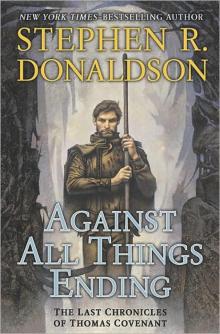 Against All Things Ending
Against All Things Ending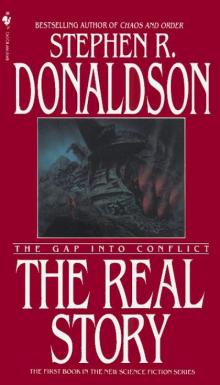 The Real Story: The Gap Into Conflict
The Real Story: The Gap Into Conflict The Power That Preserves
The Power That Preserves Seventh Decimate
Seventh Decimate The Gap Into Power: A Dark and Hungry God Arises
The Gap Into Power: A Dark and Hungry God Arises A Man Rides Through
A Man Rides Through The Gap Into Vision: Forbidden Knowledge
The Gap Into Vision: Forbidden Knowledge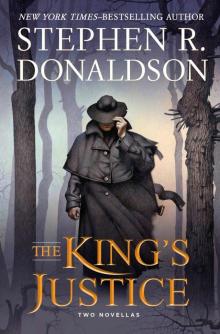 The King's Justice: Two Novellas
The King's Justice: Two Novellas The Wounded Land
The Wounded Land The Runes of the Earth
The Runes of the Earth Mordant's Need
Mordant's Need The One Tree
The One Tree Gilden-Fire
Gilden-Fire Reave the Just and Other Tales
Reave the Just and Other Tales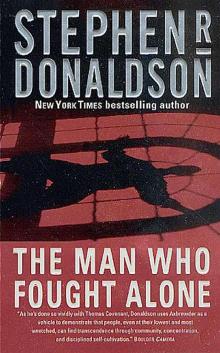 The Man Who Fought Alone
The Man Who Fought Alone The Last Dark
The Last Dark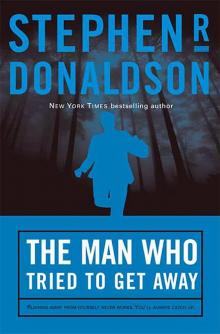 The Man Who Tried to Get Away
The Man Who Tried to Get Away Thomas Covenant 02: The Illearth War
Thomas Covenant 02: The Illearth War A Dark and Hungry God Arises
A Dark and Hungry God Arises The One Tree t2cotc-2
The One Tree t2cotc-2 Lord Foul's Bane cotc-1
Lord Foul's Bane cotc-1 The Illearth War t1cotc-2
The Illearth War t1cotc-2 The Runes of the Earth: The Last Chronicles of Thomas Covenant - Book One
The Runes of the Earth: The Last Chronicles of Thomas Covenant - Book One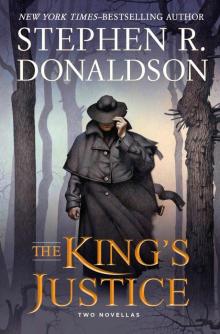 The King's Justice
The King's Justice White Gold Wielder t2cotc-3
White Gold Wielder t2cotc-3 The Power That Preserves t1cotc-3
The Power That Preserves t1cotc-3 Thomas Covenant 01: Lord Foul's Bane
Thomas Covenant 01: Lord Foul's Bane Chaos and Order: The Gap Into Madness
Chaos and Order: The Gap Into Madness Daughter of Regals
Daughter of Regals Forbidden Knowledge: The Gap Into Vision
Forbidden Knowledge: The Gap Into Vision Fatal Revenant t3cotc-2
Fatal Revenant t3cotc-2 The Runes of the Earth t3cotc-1
The Runes of the Earth t3cotc-1 Thomas Covenant 03: Power That Preserves
Thomas Covenant 03: Power That Preserves This Day all Gods Die: The Gap into Ruin
This Day all Gods Die: The Gap into Ruin The Wounded Land t2cotc-1
The Wounded Land t2cotc-1 This Day All Gods Die
This Day All Gods Die One Tree
One Tree